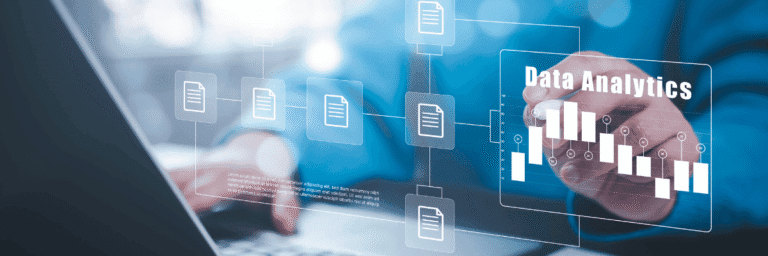Building AI that actually works for your business is harder than it looks.
Companies often start with big plans for automation and smarter workflows. Then reality hits. The models hallucinate. Integration breaks existing systems. Costs spiral beyond initial estimates. Teams spend months troubleshooting instead of shipping.
The difference between success and failure usually comes down to one thing: picking the right LLM development services provider.
You need someone who understands your industry, handles your data securely, and builds solutions that integrate without drama. But how do you tell which vendors can deliver versus which ones just talk a good game?
This guide walks through what matters when choosing LLM development partners. You’ll learn which technical capabilities actually count, how pricing models work, what questions separate experts from amateurs, and which red flags mean you should walk away.
Whether you’re looking at custom model training, fine-tuning pre-trained models, or setting up retrieval augmented generation systems, you need clarity on what you’re buying and why it matters.
Key Takeaways
- Choosing the right LLM development company decides whether your AI project delivers value or drains resources.
- Custom LLMs protect data privacy, cut long-term costs, and perform better than generic APIs.
- Vendors like Kanerika, InData Labs, and SoluLab stand out for real enterprise deployments and domain-specific expertise.
- Look for providers who combine technical skill with strong security, integration, and post-deployment support.
- Transparent pricing, proven case studies, and scalable architecture separate trusted LLM partners from short-term contractors.
Transform Your Business with Powerful and Secure LLM Solutions!
Partner with Kanerika for Expert AI implementation Services
What Are LLM Development Services?
LLM development services help businesses build, customize, and deploy large language models for specific needs. These services cover everything from strategy and consulting to actual model development, fine-tuning existing models like GPT or Claude, integration with your current systems, and ongoing maintenance.
Think of it as hiring experts who know how to make AI language models work for your particular business problems instead of figuring it out yourself.
Why LLM Development Services Matter Now
1. Your Data Stays Private
Off-the-shelf AI tools send your information to external servers. That’s a problem when you’re dealing with customer records, financial data, or trade secrets. Custom LLM solutions keep proprietary information inside your infrastructure where you control access.
- You decide who sees sensitive business data
- Compliance with regulations like GDPR and HIPAA becomes manageable
- No risk of your competitive intelligence leaking through third-party APIs
2. Generic Models Don’t Understand Your Industry
Standard ChatGPT doesn’t know your company’s terminology, processes, or specific domain knowledge. A generic model trained on internet text won’t grasp legal nuances, medical protocols, or financial regulations the way a specialized model can.
- Models trained on your domain data understand context better
- Fewer errors when dealing with industry-specific terms and concepts
- Responses that actually match how your business operates
3. Costs Add Up Fast at Scale
Paying per API call seems cheap until you’re processing thousands of requests daily. Token-based pricing from OpenAI or Anthropic can reach $500,000 yearly for high-volume use. Custom models cost more upfront but often pay for themselves within 6 to 12 months.
- Break-even typically happens around 2 million tokens per day
- No surprise bills when usage spikes
- Predictable infrastructure costs you can budget for
4. Automation That Actually Works
Most businesses want AI to handle repetitive tasks like answering customer questions, processing documents, or generating reports. But automation only helps if it works reliably without constant human oversight.
- Pre-trained models need constant supervision and correction
- Custom solutions learn your specific workflows and edge cases
- Less time fixing mistakes means teams focus on valuable work
5. Competitive Edge You Can’t Buy Off the Shelf
When everyone uses the same ChatGPT API, nobody has an advantage. Custom LLM capabilities tailored to your business create features competitors can’t easily replicate.
- Unique AI features become part of your product offering
- Better customer experiences through personalization
- Innovation that sets you apart in your market
What Are the Core LLM Development Services Offered?
1. LLM Strategy and Consulting
Good vendors start by figuring out if you actually need custom AI and what problems it should solve. They assess your current systems, identify high-impact use cases, and create a realistic roadmap that matches your budget and timeline.
- Analysis of your business processes to find where AI adds real value
- Technology stack recommendations based on your infrastructure and team skills
- Step-by-step implementation plan with clear milestones and cost estimates
2. Custom LLM Development from Scratch
Building a model from the ground up means designing architecture, training on your specific datasets, and optimizing parameters for your exact needs. This route makes sense when you need deep specialization and have unique requirements no existing model handles well.
- Complete control over model behavior, size, and capabilities
- Training on proprietary data that reflects your domain knowledge
- Ownership of the model without ongoing licensing fees
3. LLM Fine-Tuning Services
Fine-tuning adapts existing models like GPT, BERT, or LLaMA to your specific tasks without building from scratch. Providers use techniques like LoRA and QLoRA to adjust model parameters based on your data, which costs less and takes less time than full custom development.
- Faster deployment since you start with a proven base model
- Lower computational costs compared to training from zero
- Better performance on your specific tasks while keeping general capabilities

4. RAG Implementation
Retrieval augmented generation connects language models to your knowledge bases so they pull current, accurate information before responding. This approach reduces hallucinations and keeps answers grounded in your actual documents without expensive retraining.
- Models cite real sources from your databases instead of making things up
- Easy updates by changing knowledge base content, no model retraining needed
- Works well for customer support, internal knowledge systems, and document analysis
5. LLM Integration and Deployment
Getting AI working inside your existing software stack requires API development, system connections, and careful testing. Professional services handle integration with CRMs, ERPs, customer portals, and internal tools so the model actually gets used instead of sitting isolated.
- Connections to platforms like Salesforce, SAP, or custom applications
- APIs designed for your team’s workflows and security requirements
- Testing to catch problems before they affect real users
6. Model Optimization and Performance Tuning
After deployment, models need ongoing work to maintain accuracy and speed. Services include monitoring response quality, reducing inference costs through quantization and pruning, and fixing drift when model performance degrades over time.
- Regular performance tracking to catch issues early
- Optimization techniques that cut computational costs by 30% to 50%
- Updates when your business needs change or new data becomes available
7. Prompt Engineering and Testing
How you ask questions dramatically affects what answers you get. Expert services design prompt templates, test different approaches, and build systems that consistently produce reliable outputs for your specific use cases.
- Structured prompts that reduce errors and improve consistency
- Testing frameworks to validate model responses meet quality standards
- Documentation so your team knows how to interact with the model effectively
8. Security and Compliance Implementation
Enterprise AI needs encryption, access controls, audit trails, and compliance with regulations. Professional services build security into the architecture from day one instead of treating it as an afterthought.
- Data encryption in transit and at rest
- Compliance frameworks for GDPR, HIPAA, SOC 2, and industry regulations
- Access controls that limit who can use the model and see outputs
Partner with Kanerika to Modernize Your Enterprise Operations with High-Impact Data & AI Solutions
Top LLM Development Services Companies
1. Kanerika
Kanerika is a global tech consulting firm specializing in AI, analytics, and automation services. They focus on building autonomous AI agents and agentic AI solutions that execute complex workflows with minimal human intervention.
LLM Services Offered
- Custom LLM development and model creation
- Agentic AI and autonomous agent development
- RAG implementation for enterprise knowledge retrieval
- MLOps implementation and natural language processing
- LLM integration with existing business systems
Industries Served
- Financial services and banking (BFSI)
- Retail and e-commerce
- Manufacturing
- Supply chain and logistics
- Healthcare
Key Clients: Kroger, MDFC bank, Sony, Toyota, Volkswagen, and others
Key Partnerships Technology partnerships with Microsoft, Databricks, UiPath, Informatica, and others.
2. InData Labs
InData Labs is a data science and AI consulting company established in 2014. They deliver tech-driven solutions with a focus on maximizing automation and reducing operational costs through advanced AI implementations.
LLM Services Offered
- Custom model development on GPT, DALL.E2, and foundation models
- Fine-tuning large language models on custom datasets
- Sentiment analysis and customer analysis applications
- Cloud migration and infrastructure optimization
- Conversational AI integration into business applications
Industries Served
- Fintech
- Retail and e-commerce
- Marketing and advertising
- Telecommunications
3. OpenXcell
OpenXcell is a software development company that has been delivering quality services driven by modern tech stacks and extensive industry expertise. They focus on building resilient, secure LLM solutions aligned with industry standards.
LLM Services Offered
- Strategy and consulting for LLM implementation
- Custom LLM development with sentiment analysis and NLP
- Fine-tuning open-source models like BERT, GPT, Llama 2, and Mistral
- Full-stack integration with CRM, ERP, and workflow systems
- Security implementation with HIPAA, GDPR, and SOC 2 compliance
Industries Served Information about specific industries not detailed in search results.
4. Master of Code
Master of Code is an experienced LLM development company that helps startups and global enterprises deploy AI solutions. They understand technical and operational challenges across different business sizes.
LLM Services Offered
- LLM strategy and business case validation
- Custom domain-specific LLM development
- AI-powered chatbot development with full-stack integration
- Model optimization using quantization and compression
- Continuous monitoring and automated retraining pipelines
- RAG implementation using vector databases
Industries Served Information about specific industries not detailed in search results.
Key Clients Specific client names not publicly disclosed in search results.
Key Partnerships
- Cloud platforms: AWS, Google Cloud Platform, Microsoft Azure
Proprietary Technology LOFT (LLM-Orchestrator Framework) for high-throughput, scalable enterprise deployments.
5. SoluLab
SoluLab is recognized for extensive expertise in LLM development with innovative solutions and a client-centric approach. They focus on delivering scalable and customized solutions for businesses.
LLM Services Offered
- Large language model development from scratch
- LLM fine-tuning for domain-specific tasks
- LLM-powered application development
- Model integration and API support
- Data analysis, insights, and sentiment analysis
- Content personalization
Industries Served
- Finance and banking
- Healthcare
- Retail and e-commerce
- Education
- Media and entertainment
- Legal services
- Technology
6. EffectiveSoft
EffectiveSoft is an AI services company with deep expertise and strategic partnerships. Their problem-solvers and tech minds focus on production-ready solutions with a mature product development approach.
LLM Services Offered
- Custom LLM development for content creation and translation
- LLM consulting with tailored implementation strategies
- Model customization and fine-tuning
- End-to-end LLMOps services
- Post-deployment monitoring, troubleshooting, and updates
- Hallucination reduction services
Industries Served
- Financial services (fraud detection, credit risk, algorithmic trading)
- Healthcare (clinical transcription, patient communication, treatment plans, drug discovery)
- Retail and e-commerce (customer service, marketing, demand prediction)
- Logistics (route optimization, predictive maintenance, supply chain identification)
7. Prismetric
Prismetric is a trusted AI service provider and LLM solutions company focused on enhancing automation, accuracy, and efficiency through custom-built models designed for smarter decision-making.
LLM Services Offered
- Building models from scratch or fine-tuning GPT and LLaMA
- AI-powered chatbots, virtual assistants, and content generation tools
- Integration with CRMs, data analytics tools, and enterprise applications
- Sentiment analysis model development
- End-to-end model maintenance and support services
Industries Served
- Healthcare (clinical documentation, virtual health assistants)
- Finance (risk assessment, fraud detection, customer service automation)
- Automotive (autonomous vehicles, predictive maintenance, AI diagnostics)
- Hospitality and travel (booking automation, itinerary planning, language translation)
- Education (tutoring systems, personalized learning)
8. Geniusee
Geniusee is a large language model development company with FinTech as one of their core industries. They bring expertise in natural language processing and neural networks to help businesses create needed LLM solutions.
LLM Services Offered
- Custom LLM development with data collection and architecture design
- Fine-tuning using LoRA and QLoRA techniques for BERT and GPT
- Integration using Nvidia Triton for production deployment
- Bug fixes, model updates, and performance monitoring
- Data management and optimization
Industries Served
- FinTech (core industry)
- Healthcare
- Education (K-12 providers)
- Payment services
9. Addepto
Addepto focuses on responsible AI development with a commitment to ethical implementation, bias prevention, and data privacy throughout the LLM development lifecycle.
LLM Services Offered
- Seamless LLM integration into existing systems and workflows
- Performance optimization using quantization and pruning techniques
- Ethical AI implementation with bias safeguards
- Scalability solutions from proof-of-concept to enterprise deployment
- Ongoing support, maintenance, and technical updates
Industries Served: Multiple industries with focus on enterprise-wide deployments.
10. Bacancy Technology
Bacancy Technology is an ISO-certified company founded in 2011 with operations across Florida, Canada, and India. They serve major enterprises with custom LLM solutions and proven expertise.
LLM Services Offered
- Custom solutions using GPT-4, LLaMA 3.1, PaLM 2, or Megatron Core
- Fine-tuning services with LoRA and QLoRA techniques
- LLM-powered intelligent chatbots using Rasa and Dialogflow
- Multilingual LLM development for global communication
- Sentiment analysis systems for customer feedback
- Real-time support and maintenance post-deployment
Industries Served Multiple industries including manufacturing, automotive, and technology sectors.
Key Clients
- FRANKLIN
- 3M
- Volkswagen
- Scotch
- Infosys
Partner with Kanerika to Modernize Your Enterprise Operations with High-Impact Data & AI Solutions
Choosing the Right LLM Development Company
Picking an LLM development partner affects whether your AI project succeeds or drains resources. Most companies struggle because they focus on the wrong factors or miss critical red flags.
Here’s what actually matters when evaluating vendors.
1. Technical Expertise That Goes Beyond Marketing Claims
Anyone can claim they build custom models. Few companies can prove they’ve solved problems similar to yours.
What to Look for
- Experience with transformer architectures and neural networks
- Hands-on work with frameworks like PyTorch, TensorFlow, or Hugging Face
- Understanding of different model types (encoder-decoder, autoregressive, specialized architectures)
Questions to Ask
Can you walk me through a similar project you’ve completed? What specific challenges did you encounter and how did you solve them? What models did you use and why?
Good vendors explain their technical decisions clearly. Bad ones give vague answers or lean heavily on buzzwords.
2. Industry-Specific Knowledge
Generic AI expertise doesn’t translate well across industries. Healthcare models need different approaches than financial services. Legal applications have unique requirements that retail systems don’t face.
What Matters
- Proven experience in your specific sector
- Understanding of industry regulations and compliance requirements
- Knowledge of domain terminology and workflows
- Case studies from companies facing similar challenges
Warning Signs
Vendors who claim their solution works equally well for any industry usually haven’t gone deep enough in any single one. Specialization matters more than breadth when you need models that actually understand your business context.
3. Security and Compliance Infrastructure
Data breaches cost companies millions. Regulatory violations can shut down entire projects. Security needs to be built into the architecture from day one, not added later.
Must-have Capabilities
- Data encryption in transit and at rest
- Access controls and authentication systems
- Compliance frameworks for your industry (GDPR, HIPAA, SOC 2, PCI DSS)
- Regular security audits and vulnerability assessments
- Clear data handling and retention policies
Red Flags
If a vendor treats security as a checkbox item or suggests adding it “after the MVP,” walk away. Retrofitting security into AI systems costs far more than building it in from the start.
4. Integration Approach and Technical Compatibility
Your new LLM solution needs to work with existing systems. Poor integration planning leads to projects that technically work but nobody can actually use.
Key Considerations
- Experience integrating with your current tech stack
- API design and documentation quality
- Support for your preferred deployment environment (cloud, on-premise, hybrid)
- Understanding of your data infrastructure and workflows
Smart questions
How will this integrate with our CRM/ERP/existing systems? What happens if our infrastructure changes? Can you show examples of your API documentation and integration guides?
Companies that skip discovery and promise quick integration usually deliver solutions that create more problems than they solve.
5. Proven Track Record With Measurable Results
Marketing materials tell you what vendors want you to believe. Client outcomes show you what they actually deliver.
Look for Specifics
- Quantifiable results from past projects (cost savings, efficiency gains, accuracy improvements)
- Client testimonials that discuss actual problems solved, not just praise
- Case studies with detailed implementation timelines and challenges faced
- References you can contact directly
What to Avoid
Vague success stories without numbers. Generic client quotes. Companies that won’t provide references or detailed case studies likely don’t have impressive results to share.
6. Service Offerings That Match Your Needs
Some companies excel at strategy and consulting. Others focus purely on technical implementation. You need alignment between what they offer and what your project requires.
Common Service Models
- Full-cycle development (strategy through deployment and maintenance)
- Consulting and advisory (helping you make decisions, not building solutions)
- Implementation only (you provide requirements, they build)
- Staff augmentation (adding their experts to your team)
Clarity Matters
Make sure you understand exactly what’s included in their proposal. “LLM development services” means different things to different vendors. Get specifics about deliverables, timelines, and who owns what parts of the process.
7. Realistic Cost Structure and Pricing Transparency
The cheapest option usually becomes the most expensive. Hidden costs, scope creep, and rework add up fast when vendors underbid to win contracts.
What to Evaluate
- Detailed breakdown of costs (development, infrastructure, ongoing maintenance)
- Clear pricing for different phases of work
- Policies on change requests and scope adjustments
- Transparency about what drives costs up or down
Warning Signs
Quotes that seem too good to be true usually are. Vendors who avoid discussing ongoing costs or infrastructure expenses will surprise you with bills later. Ask specifically about costs after deployment.
8. Post-Deployment Support and Maintenance Plans
Models drift over time. User needs change. Systems require updates. Your vendor relationship shouldn’t end at deployment.
Essential Support Elements
- Performance monitoring and optimization services
- Regular model updates and retraining capabilities
- Bug fixes and troubleshooting response times
- Documentation and knowledge transfer
- Training for your internal team
Long-term Partnership Indicators
Companies serious about your success offer comprehensive maintenance plans, not just “we’ll fix bugs if they happen.” They should explain how they’ll keep your model performing well as your data and business evolve.
9. Communication Style and Project Management
Technical skills matter, but so does working relationship. Projects fail when communication breaks down, even with great technical teams.
Green Flags
- Clear project milestones and regular check-ins
- Transparent about challenges and setbacks
- Responsive to questions and concerns
- Involve you in key decisions without overwhelming you with technical details
Red fFags
Vendors who go silent between milestones. Teams that make major decisions without consulting you. Companies that can’t explain technical concepts in business terms you understand.
10. Flexibility and Scalability Planning
Your needs today differ from your needs in six months or two years. Good vendors build systems that grow with you.
Key Questions
How does the solution handle increased usage? What happens when we need new features? Can we move to different infrastructure later if needed? How do you handle changing requirements?
Rigid solutions locked to specific platforms or vendors create problems down the road. Look for partners who build with flexibility in mind.
Frequently Answered Questions
What are LLM development services?
LLM development services help businesses build, customize, and deploy large language models for specific needs. Services include strategy consulting, custom model development, fine-tuning existing models like GPT or LLaMA, integration with current systems, RAG implementation, and ongoing maintenance. Providers handle technical complexities while ensuring solutions align with business goals and security requirements.
Should I build a custom LLM or use pre-trained models?
Use pre-trained models (GPT, Claude, Gemini) when you need quick deployment and general capabilities. Build custom LLMs when you require deep domain specialization, handle sensitive proprietary data, need specific compliance requirements, or process high volumes where API costs exceed custom infrastructure expenses. Fine-tuning pre-trained models offers a middle ground with faster deployment and lower costs than building from scratch.
What's the difference between RAG and fine-tuning?
RAG (retrieval augmented generation) connects models to external knowledge bases, retrieving current information before generating responses. Fine-tuning retrains model parameters on specialized datasets for domain-specific tasks. RAG works better for dynamic, frequently updated information. Fine-tuning excels for specialized domains needing consistent responses. Many solutions use both approaches together for optimal results.
How long does it take to develop a custom LLM?
Development timelines depend on project scope and complexity. Simple fine-tuning projects take 4 to 8 weeks. Custom model development from scratch requires 3 to 6 months. Enterprise solutions with extensive integration, testing, and compliance needs can take 6 to 12 months. Timeline factors include data availability, model complexity, team expertise, infrastructure setup, and testing requirements.
What industries benefit most from custom LLM development?
Healthcare benefits through clinical documentation and patient communication. Financial services use LLMs for fraud detection and risk assessment. Legal firms automate document analysis and contract review. Retail improves customer service and personalization. Education creates adaptive learning systems. Manufacturing optimizes operations. Any industry handling large text volumes, requiring specialized knowledge, or needing automated communication benefits significantly.
How do LLM development companies ensure data security?
Professional providers implement multi-layer security including data encryption in transit and at rest, access controls, secure authentication systems, and regular security audits. They ensure compliance with regulations like GDPR, HIPAA, and SOC 2. Custom deployments keep proprietary data within your infrastructure. Vendors should provide clear data handling policies, anonymization techniques, and vulnerability assessments throughout development.
Can LLMs integrate with existing business systems?
Yes. Professional LLM services include integration with CRMs, ERPs, customer portals, and internal tools through API development and custom connectors. Integration requires careful planning around data formats, authentication, workflow compatibility, and testing. Good vendors assess your current tech stack during discovery and design solutions that work within existing infrastructure without requiring complete system overhauls.
What's the difference between LLM consulting and development?
LLM consulting focuses on strategy, helping you identify use cases, assess feasibility, select appropriate models, and plan implementation roadmaps. Development involves actual building, training, testing, and deploying models. Consulting answers “what and why,” while development handles “how.” Many providers offer both services. Some projects need only consulting if existing solutions suffice, while others require full development services.










